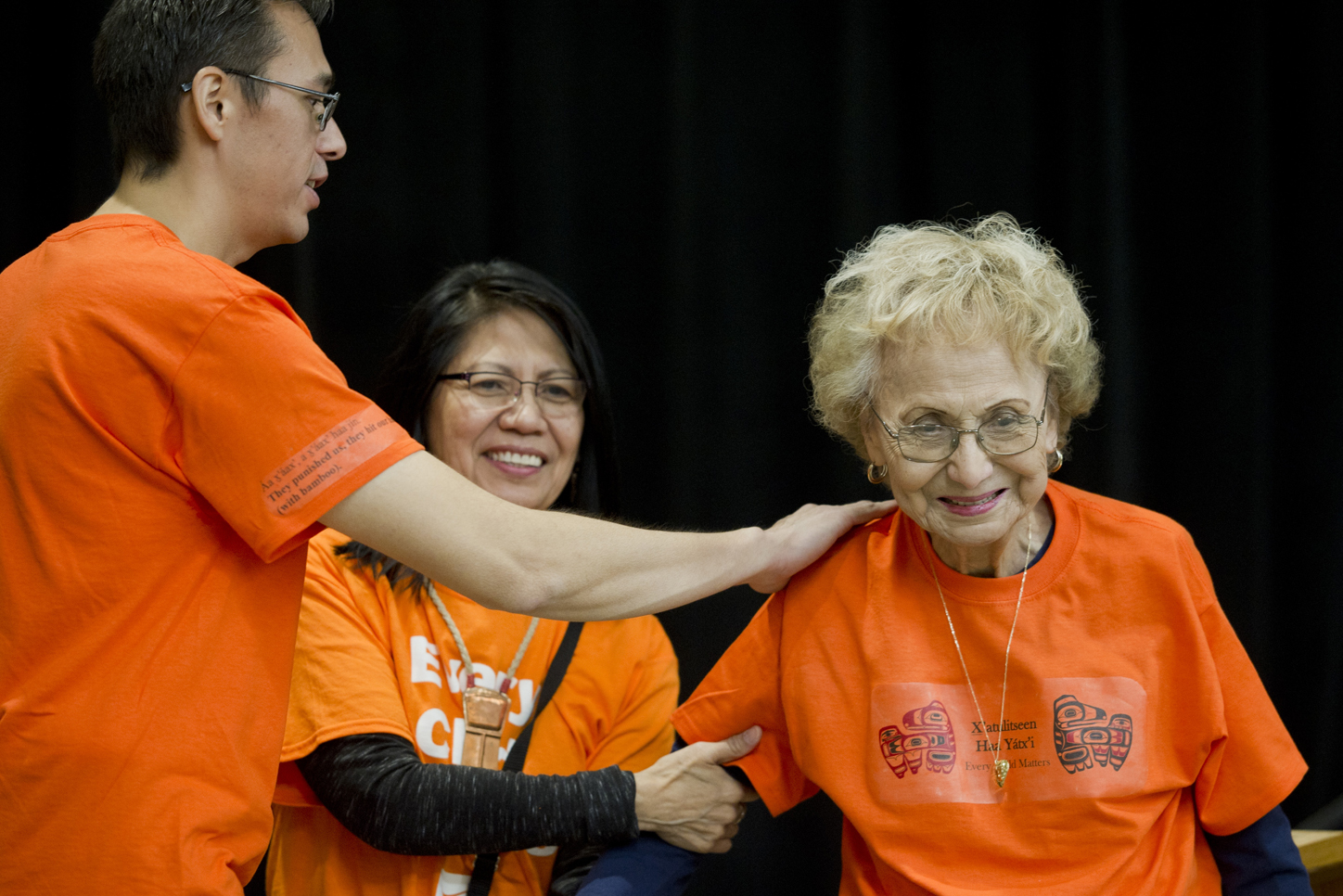On Friday morning, elementary school-aged children wearing bright orange T-shirts danced and sang in Tlingit in front of their teachers, family and other community members with two girls beating on drums, their calls reaching to the far back of Elizabeth Peratrovich Hall.
The children were participating in Orange Shirt Day, held on Sept. 30 of each year since 2013, which is an international, commemorational event of the indigenous people who were forced to go to boarding schools in Alaska, or residential schools in Canada.
The special day originated with the story of Phyllis Jack Webstad who first went to a mission school in Canada in 1973-74 when she just turned 6 years old. In her statement shared on orangeshirtday.org and a video shared at the event, she said that her family never had much money, but her granny bought her a new outfit for her first day — an orange shirt. But when she got to the school, she said she was stripped and her clothes taken from her. She never saw the shirt again. It was a symbolic moment of how she and other native children were treated.
Orange Shirt Day is held now to remember the treatment of Native children in the school system and to advocate for anti-racism and anti-bullying policies and attitudes. The message is written plainly on the shirts; in English, “Every child matters.” In Tlingit, “X’atulitseen Haa Yatx’i” which translates to “children are important/precious to us.” Event organizers wish for the children to take pride in who they are, where they come from and their Native languages.
A significant portion of the event was spoken in Tlingit. Hans Chester, a Tlingit language and culture teacher at Glacier Valley Elementary School made introductions in Tlingit to all gathered and explained the history of the event. He invited two elders to speak to the gathering.
“I didn’t think I’d get this emotional,” elder Selina Everson said as she recounted her time at one of the schools, and how if she didn’t grow up in Angoon, a place where Tlingit was spoken, she might have lost her language. She said teachers have changed and have more receptive responses on Alaska Native children’s culture and language now.
“I put it out of my mind that we weren’t permitted to speak our own language,” she said as a woman from a nearby row came forward to put a supportive hand on her back. “We learn to forgive and forget. To get along with other cultures is important, to understand their ways, their language, their customs. I will not repeat some of the words I used to hear about our culture,” Everson said, voice breaking.
When elder David Katzeek took the podium, he passionately referenced the video of Webstad. “[The shirt] was taken away from [Webstad] on purpose. It was not just an accident. A person made up their mind to do what they did. It was not necessarily because that individual did not understand the culture … it was likely the individual understood the culture,” Katzeek said. “[The shirt] was not a beaded blanket or something made real super fancy but it was something given to her by her grandma and she had a relationship with it basically because she had a relationship with her grandmother who spoke the Tlingit language.”
Katzeek called up all who were involved in the event to come to the front to be recognized for their efforts in keeping the Tlingit language and culture alive. Later, the children got their own chance to come forward and thank their elders in Tlingit for their words, which many of them had been learning to speak at Harborview Elementary School’s Tlingit Culture, Language and Literacy Program or Glacier Valley’s Tlingit program. Then they sang and performed more dances, parents and grand parents smiling fondly as the children proudly performed. One toddler in the audience watched raptly and began dancing too, waving her arms to mirror the older children.
Chester came forward to close, speaking of how he did not get to learn Tlingit at home, and only just began learning in 1996. Every time he hears an elder’s story about their experience at a boarding school and being forbidden to speak their language, he said it’s heart breaking.
“But all of that starts to evaporate and go away when we hear the kids laugh, when we hear the kids speak our language.”
• Contact Clara Miller at 523-2243 or at clara.miller@juneauempire.com.
Read more news:
Walker: No decision on the Road yet
Contrary to claims, cutting the flowers downtown won’t save the city much money
Murkowski presses Forest Service on delayed land swap

